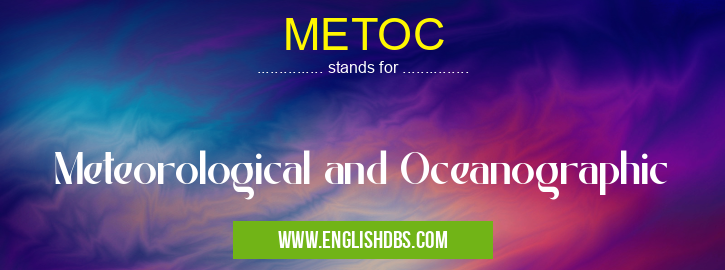What does METOC mean in MILITARY
Meteorological and Oceanographic (METOC) is an interdisciplinary branch of science dealing with the atmospheric and oceanic environment. It involves a range of disciplines including atmospheric science, oceanography, climatology, meteorology, hydrology, ecology and geophysics. METOC is used in various fields such as forecasting weather conditions, observing sea level changes, managing water resources and air pollution control. It also plays an important role in supporting military operations by providing forecasts for navigation, planning missions and making decisions on weapon systems use. METOC offers a unique opportunity to study nature’s dynamics and its impacts on humans.

METOC meaning in Military in Governmental
METOC mostly used in an acronym Military in Category Governmental that means Meteorological and Oceanographic
Shorthand: METOC,
Full Form: Meteorological and Oceanographic
For more information of "Meteorological and Oceanographic", see the section below.
» Governmental » Military
Essential Questions and Answers on Meteorological and Oceanographic in "GOVERNMENTAL»MILITARY"
What is Metoc?
Metoc stands for Meteorological and Oceanographic which are disciplines related to the study of atmospheric conditions and oceanic movements.
What are the two main branches of Meteorology and Oceanography?
The two main branches of Meteorology and Oceanography are Atmospheric Science, which deals with meteorological phenomena, such as air pressure, temperature, humidity, etc.; and Marine Science, which concentrates on the physical, chemical and biological aspects of the ocean.
What is the difference between weather prediction and climate prediction?
Weather prediction involves predicting short-term changes in atmospheric conditions over a period of hours to days. On the other hand, climate prediction focuses on long-term trends in weather patterns over years or decades.
How can Metoc be used in practical applications?
Metoc has applications in many different fields including agriculture, aviation, military operations, engineering and urban planning. For example, reliable meteorological information can assist farmers in determining when to sow their crops or when to harvest them; it can help engineers design structurally sound buildings; it can assist aviators in developing flight plans that are safe from storms; and it can provide important data for urban planners looking to create efficient infrastructure systems.
Are there any special instruments used for Metoc research?
Yes! Various technologies such as buoys, sonar maps and satellites are utilized by individuals studying Metoc phenomena. A variety of experiments using these devices frequently take place with the intention of gathering more information about weather events or marine life behavior.
Is assessment regarding climate change a part of Metoc research?
Absolutely! Climate change assessment is an important field within Metoc research due to its implications for both human populations and ecosystems around the world. Such assessments involve a combination of scientific observation methods as well as advanced models capable of simulating potential future climates scenarios. The goal is often to inform policy makers so they may implement actionable solutions to mitigate against further global warming trends or develop strategies for adaptation.
Do scientists from diverse disciplines work together during Metoc research projects?
Yes! Multidisciplinary teams consisting of experts from fields like physics, chemistry, mathematics; social sciences such as anthropology; engineering disciplines such as geology – all work together to better understand how changing meteorological or oceanographical conditions affect humans and natural environments alike. This kind collaboration allows researchers gain a greater understanding about how their respective disciplinary contribution influences overall results.
What would happen if we had no metrology or oceanography studies?
Without accurate forecast systems based on metrology/oceanography data collected through experiments conducted by researchers in this field it would be difficult (if not impossible) to predict changes in weather patterns or ocean levels that could influence urban planning efforts at mitigating flooding disasters caused by extreme rainfall events or devise evacuation plans ahead-of-time given tsunami warning warnings issued after earthquakes offshore.
Are there any educational requirements needed to pursue a career in metrology/oceanography?
Generally speaking most positions within meteorology/oceanography requires some sort postsecondary degree program either at undergraduate level (e.g., BScMeteorology) or graduate level (e.g., MScMeteorology). However depending on the type job you’re applying for additional qualifications such programming languages (HTML5/CSS3), GIS knowledge (Geographic Information Systems) computer graphics skills might also be required.
Final Words:
In summary, Meteorological and Oceanographic (METOC) is an essential field of science that deals with understanding both the atmosphere and oceans on our planet. By combining data from different physical sciences it helps us forecast extreme weather events as well as plan ahead so that we can mitigate their effect on humans effectively. In addition to this it also provides us with invaluable information about Earth’s past climate conditions which is key for formulating better strategies against global warming in the long term.
